Leading the way for evidence-based healthcare in Latin America
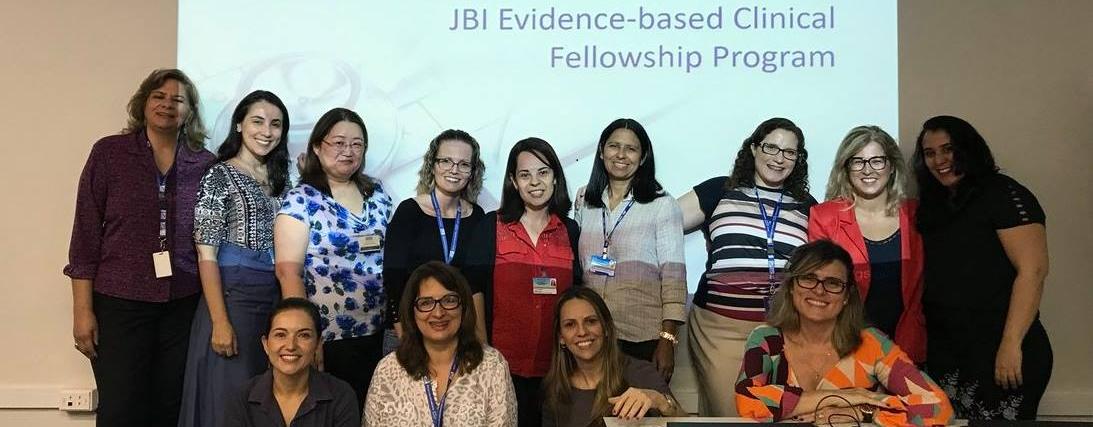
“As professionals in a teaching hospital, we participate in the formation of undergraduate and postgraduate students, in addition to taking care of patients. This mission gives us an enormous responsibility, as we represent a role model to future health professionals who attend their internship with us. To have the capacity to provide care to people and make a difference in their lives was the reason why I chose to be a nurse in the first place. What I have always pursued, and what I constantly strive for, is how to offer the best (evidence-based) care to our patients. I always question: can we do better? and how can we do this?” – Dr Shimoda
Dr Gilceria Shimoda is a Nursing Practitioner at the Department of Nursing at the University Hospital of the University of São Paulo (HU-USP) which is a public, teaching hospital of secondary care complexity. It has 178 active beds, distributed among Medical, Surgical, Paediatrics and Obstetrics areas. As a clinical partner of the Brazilian Centre for Evidence-based Healthcare:A JBI Centre of Excellence, the hospital is focused on implementing evidence-based healthcare and improving the quality of care to patients.
In 2013 the Department of Nursing at the University Hospital, together with the School of Nursing at the University of São Paulo, created the Nucleus of Evidence-Based Nursing (NUEBE), comprised of eight nurses who had attended JBI’s Comprehensive Systematic Review Training Program, one professor from the School of Nursing, and four staff from the Brazilian Centre for Evidence-based Healthcare.
The objectives of NUEBE are:
• to promote a culture of evidence-based practice
• to educate professionals on evidence-based healthcare
• to offer workshops on implementation of best practice using JBI methodology and on JBI EBP resources
• to promote/supervise/facilitate best practice implementation projects, and
• to assist with educational training of nursing staff as part of the intervention strategies for implementation projects conducted in the hospital.
To achieve these objectives, NUEBE conducts a two-hour workshop for nursing professionals on the principles of evidence-based healthcare to build awareness and to encourage staff to question approaches to clinical practice. This is followed by a 74-hour training program to educate and empower nurses to structure clinical questions, search for evidence on databases, to perform critical analysis of the evidence, and to construct and implement evidence-based nursing protocols by using JBI clinical audit and feedback approaches.
The Brazilian Centre for Evidence-based Healthcare, as a Collaborating Entity of JBI, provides opportunities that prepare members of NUEBE with the skills necessary to implement evidence into practice. For example, five members of NUEBE are JBI Clinical Fellows, having completed the Evidence Implementation Training Program, (formerly Evidence-based Clinical Fellowship Program) at JBI in Adelaide, Australia. Three of these JBI Clinical Fellows are now accredited trainers of the EITP, offering the 6-month program to nurses directly in Brazil.
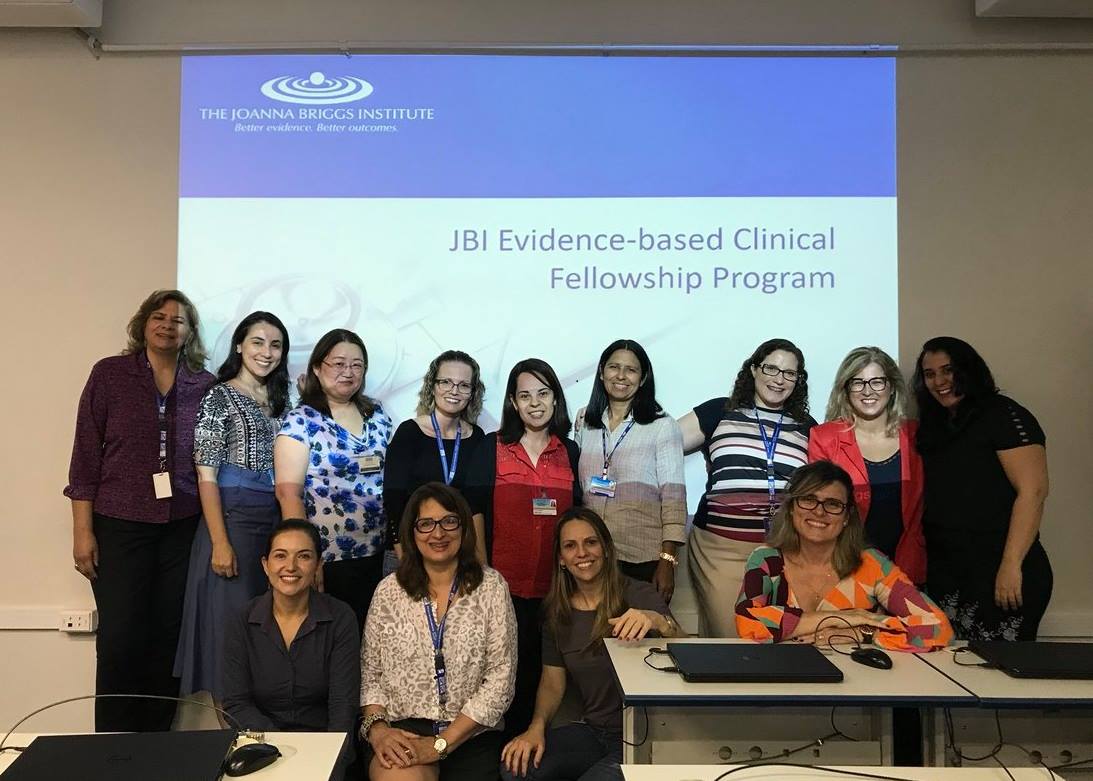
“In 2013 I was invited by JBI to take part in the JBI Evidence Implementation Training Program (EITP), in Adelaide, and learn how to implement evidence into practice using JBI clinical audits, clinical-friendly resources and tools. It was during this fellowship that I realised that we could really make a difference in our care, involving everyone in the project, and that we could assess the impact of the project systematically and objectively. The challenge then was to spread the knowledge gained and to sensitise other nursing professionals of the hospital. Luckily, the work done by NUEBE to create a culture of evidence-based healthcare within all teams facilitated this process”, said Dr Shimoda.
The JBI EITP equips clinicians with the knowledge and skills to apply evidence into clinical practice, develops their leadership skills to be effective agents of change, and encourages JBI Clinical Fellows to publish the results of their evidence implementation project. Hence, in addition to the implementation projects conducted at the HU-USP and the seven currently underway, four evidence-based implementation project reports have been published in the JBI journal.
The evidence-based implementation projects are conducted in different University Hospital settings, according to the JBI Clinical Fellows’ expertise and the needs of specific areas. The selection of implementation topic is based on the need to update or develop existing nursing care protocols, having been signalled following an adverse event, or following results of the surveillance of quality care indicators.
One such implementation project focused on central line bundle maintenance among adults, and was initiated in response to the high proportion of infection related to central venous catheters in the Intensive Care Unit. This project entailed developing and implementing a protocol for maintenance of the central line bundle maintenance based on the best available evidence in order to reduce infection rates associated with central venous catheters.
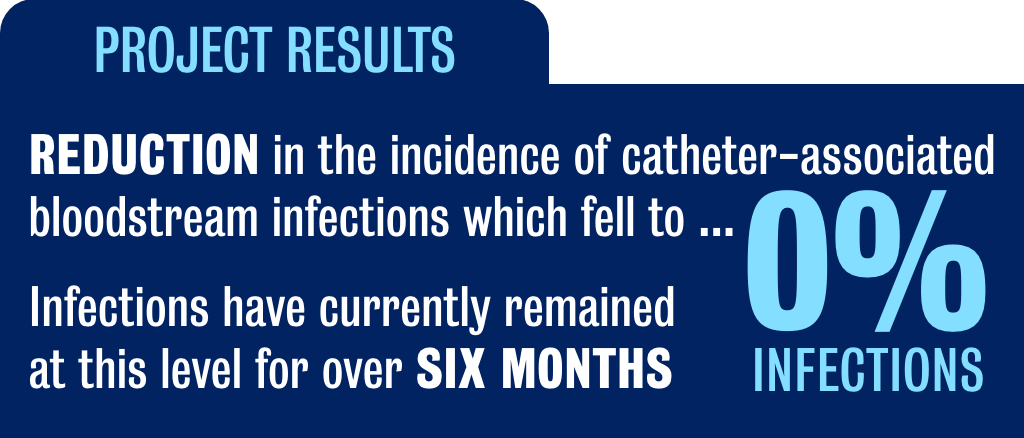
Another project focused on falls prevention strategies for adult inpatients, and was initially conducted in the Internal Medicine and Intensive Care Unit. The project was then rolled out to all adult settings of the HU-USP.
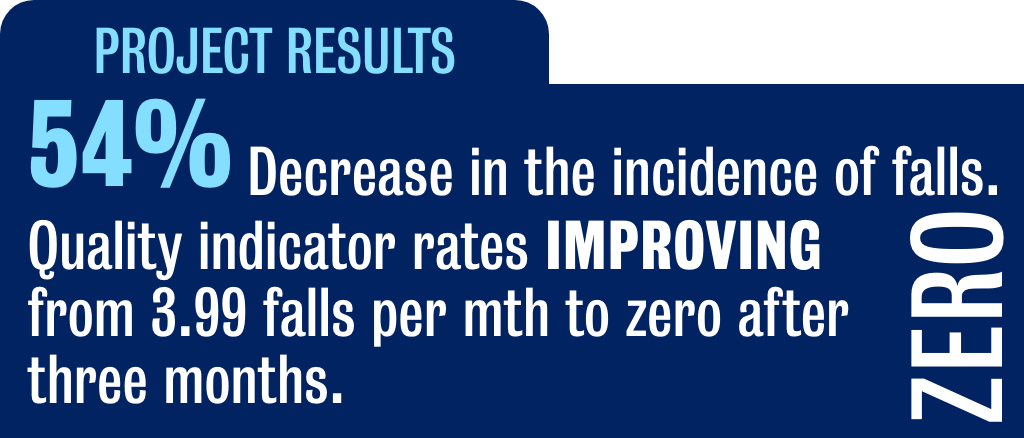
To facilitate evidence-based practice across the whole University Hospital by all clinicians, the Hospital provides easy access to JBI evidence-based tools and resources. As a clinical partner of the Brazilian Centre for Evidence-based Healthcare, the University Hospital is provided with complimentary subscription to the JBI EBP Database, which provides access to a wide range of evidence-based practice (EBP) tools and resources designed for clinicians to use at the point of care. All HU-USP computers have access to the JBI EBP Database so that every healthcare professional across all settings can access JBI resources to help with decision-making in their day-to-day work.
“The JBI Clinical Fellows have played an important role as disseminators, by sharing their knowledge of evidence-based practices and they motivate their colleagues to actively participate in the implementation projects and refer to the JBI EBP Database in their day-to-day work. Seeing those leaders demonstrating passion and persistence and leading change by encouraging colleagues to question their practices is gratifying", said Dr Shimoda.
Evidence-based projects will continue to be developed and implemented at the University Hospital, since every EBCFP offered by the Brazilian Centre for Evidence-based Healthcare will have at least one nurse from the University Hospital attending this training program. Further, the partnership with the School of Nursing of the University of São Paulo enables academic staff, postgraduate students and nurse specialists to run implementation projects with the participation of nurses from the University Hospital, thereby contributing to a collaborative partnership which closes the gap between research and clinical practice. Having University Hospital nurses who are JBI accredited trainers of the EBCFP facilitates this process.
"I can see that the seeds we have spread to build capacity in our staff have germinated; the roots are firmly planted in the ground, and we are seeing growth in our staff and in our capacity to deliver even better healthcare for our patients” - Dr Shimoda
Moreover, existing evidence-based projects will be rolled out to all other related settings in the hospital and expansion of the projects involving medical and allied healthcare teams is planned. Other plans for the near future include increasing the number of JBI accredited EBCFP trainers, which in turn will increase the number of JBI Clinical Fellows in the University Hospital, and enable the expansion of training across all regions of South America.
The University Hospital’s commitment to evidence-based healthcare and continuous quality improvement, together with its achievements in capacity building to ensure that staff have the necessary skills to implement evidence into clinical practice, and the easy access of evidence-based tools and resources, has been rewarded with the HU-USP achieving status as a JBI Endorsed Organisation.
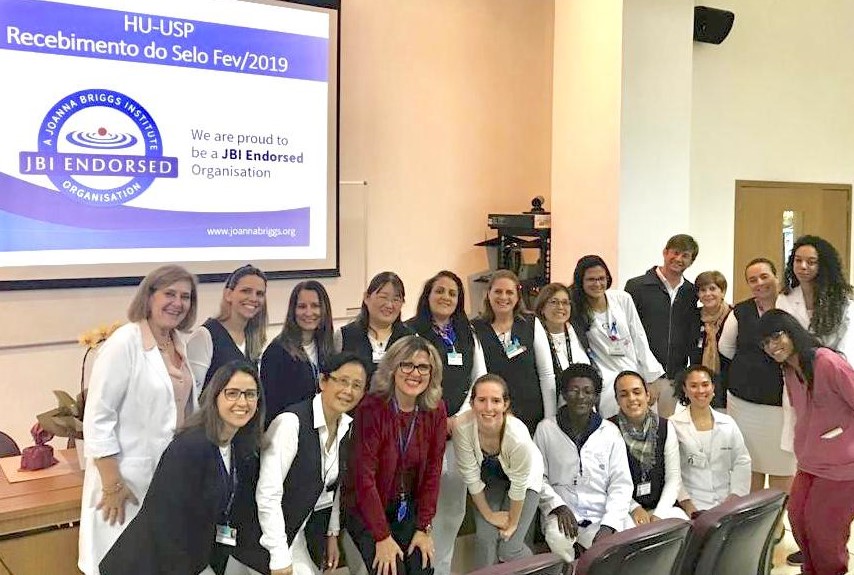
“With JBI Endorsement the HU-USP demonstrates that it practices the highest quality healthcare. This enhances the Hospital’s status and credibility as a healthcare organisation for patients, families and staff alike. The University Hospital also has increased its credibility and visibility at the national level in Brazil and across Latin America” - Assoc Prof Vilanice Alves de Araújo Püschel, Director of the Brazilian Centre for Evidence-based Healthcare: a JBI Centre of Excellence.
They say that from little things, big things grow. Instigated by a small, core group of staff, and assisted by its clinical partnership with the Brazilian Centre for Evidence-based Healthcare: a JBI Centre of Excellence, the HU-USP has grown and continues to grow exponentially in its capacity to deliver evidence-based healthcare. The University Hospital is a shining example of how to implement evidence into clinical practice and exemplifies JBI’s vision: Better evidence. Better Outcomes. Brighter Future.
Read more:
doi: 10.11124/JBISRIR-2017-003561
Maia, Flávia de Oliveira Motta; Cruz, Diná de Almeida Lopes Monteiro da; Shimoda, Gilceria Tochika; Sichieri, Karina; Iida, Luciana Inaba Senier
doi: 10.11124/JBISRIR-2017-003556
Brazilian Centre for Evidence-based Healthcare
Evidence-based Clinical Fellowship Program (EBCFP) now known as Evidence Implementation Training Program